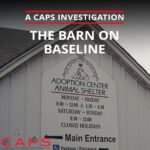Publication/Event date: 2013-03-21
Publication name: The Hull Times
URL for more info: http://hulltimes.ma.newsmemory.com/ (page 1 and 11)
Summary:
When Deborah Howard walked into a pet shop in Atlanta in 1989, she didn’t know that it would change her life forever. Appalled at the conditions of the animals, Howard wondered where they came from and why they appeared ill and uncared for. Most of us would have stopped there. We might have mentioned it to a friend in casual conversation. We might even have thought about it for quite a while. Some of us wouldn’t have given it much thought at all.
But Howard, who is now a Hull resident, did what most of us would not have done. Once she found out that pet shop animals usually come from puppy mills in which parent animals live in horrific conditions and that many pet shop puppies and kittens are ill and suffering, she made it her mission to put an end to it.
Companion Animal Protection Society (CAPS) was born in that moment. Howard, who was a lawyer and the owner of a public relations agency when she walked into that first pet shop, has dedicated her life to the cause.
Founded in 1990, CAPS is a nonprofit organization with a staff of 17 and an army of volunteers working nationwide to eradicate puppy mills and either close pet shop chains or turn them into adoption centers.
CAPS has been featured on 20/20, Dateline, CNN, and CBS, in Life, Reader’s Digest, and People magazines, and in major newspapers around the country. The organization has been responsible for shutting down Doktor Pet Centers, one of the largest pet store chains in the country (and incidentally the owner of that pet shop Howard walked into in 1984). Large-scale puppy mill breeders have been shut down and prosecuted due to CAPS efforts.
Dog breeders must be licensed by the U.S. Department of Agriculture, but such licenses do not ensure proper care standards. Puppy mills are breeding factories and often house hundreds of animals in conditions too barbaric to imagine in order to supply pet shops and Internet sites with hundreds of thousands of puppies a year. There are as many as 4,000 puppy mills in the U.S. alone.
In addition to living under inhumane conditions, puppies are vulnerable to distemper and parvovirus, potentially fatal diseases, because mother dogs may not be vaccinated. Howard has endless stories about pet shop puppies and kittens that die within days of purchase, some of them lasting not even 24 hours in their new homes.
CAPS has staged protests with up to 150 people in 40 cities in the U.S. and Canada. It has conducted undercover investigations of pet shop chains and over a thousand puppy mills, and works with lawmakers to enact laws banning the retail sale of puppies and kittens.
The organization also wages war in print.
In 2010, model Kiley Wirtz Jennings learned about CAPS and offered to enlist several industry friends to participate in an ad campaign called Models against Pet Shops and Puppy Mills. A public service announcement is running on PBS and mainstream stations nationwide, and the Long Island and Metro North railroads out of New York City are currently papered with 700 print ads.
Other ongoing campaigns include those against Happiness is Pets, The Puppy Experience, Puppy Town, Barkworks, and Pups & Pets. CAPS currently has lawsuits against Barkworks in Los Angeles and Happiness is Pets in Chicago.
One of Howard’s goals is to convert pet stores into humane adoption centers. “Millions of animals are killed in shelters,” she said. “We want to encourage people to adopt.”
Howard lives in Hull Village with a basset hound named Beatrice that was rescued from a puppy mill in 2003 and suffers from glaucoma and other physical and cardiac problems. Beatrice is now a “spokesperson” for CAPS. She has her own blog and Facebook page and was featured in the Models against Pet Shops and Puppy Mills ad campaign. She also frequents Nantasket Beach, one of her favorite walking places.
As for Howard, she was 30 years old when she walked into that pet shop in Atlanta. She is now 53 and she is not letting up.
What made her the person who did what most of us wouldn’t have done? “I’m very tenacious and I had the skills to be able to do it,” she said.
“Pet shops are decreasing because of the work we are doing. To have a lot of impact, you have to have a lot of outrage.”
Visit www.caps-web.org to learn more about CAPS and to volunteer, donate, or make a complaint against a pet shop.




